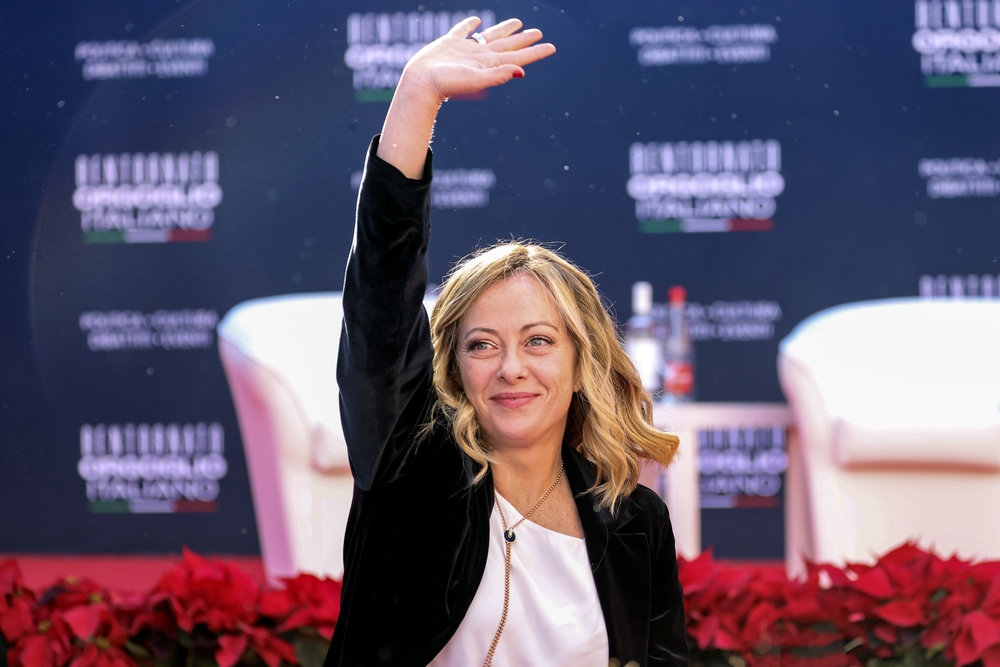NEW YORK (UNITED STATES) (ITALPRESS) – From New York, where she received the Atlantic Council’s Global Citizen Award, Prime Minister Giorgia Meloni sounds a “wake-up call” to the West that it must not “resign itself to the idea of its decline.” Meloni spoke after being introduced first by a celebratory video featuring her in action with the world’s great leaders, she the first woman to represent the Italian government. It was Elon Musk who took the floor to introduce the Prime Minister. The Tesla Ceo said he was honored to introduce someone he admires, who is as “beautiful on the inside as she is on the outside,” singing Meloni’s praises for “doing an incredible job-Italy is experiencing record growth and employment.” When Meloni’s speech began, it was a succession of praise and calls of pride in the values of the West, of which, she urged, we should not be “ashamed” but be “proud.” The speech focused on the idea that the West must not resign itself to the idea of its decline fueled by authoritarian countries but must, without being ashamed, defend concepts such as Nation and Patriotism, its civilization, its democracy and culture. She took her cue from an opinion article authored by a then Phd student, Anthony Costantini, which appeared a year ago in the “Politico,” in which Meloni’s ideas were described as “Western nationalism.” “I don’t know if nationalism is the correct word because it often recalls doctrines of aggression and authoritarianism,” Meloni said, “in any case, I know that we should not be ashamed to defend words like Nation and Patriotism. Because they mean more than a place. They are a state of mind in which one belongs to a shared culture, tradition and values.” Meloni quoted British conservative philosopher Roger Scruton, who called “oycophobia” that “contempt for one’s home” that leads to the destruction, Meloni says, of symbols of Western civilization, both in Europe and the U.S. In doing so, the West “debases itself. The result is that the West is in danger of becoming a less credible interlocutor” toward the Global South. While autocracies “are gaining ground on democracies and we risk looking more and more like a closed, self-referential fortress.” Autocracies that “cherish the narrative of the idea of the inevitable decline of the West” and, indeed, fuel it, including through the war of ideas fought on the Internet. But for Meloni, the West cannot “resign itself to the idea of its decline” or convince itself that it is a civilization with nothing to say, with the risk of creating a world “in which the law of the strongest prevails” and where, as a result, wars like the one in Ukraine multiply. Meloni said we must “remember who we are and govern what happens around us,” because we do not want to surrender “our freedom in exchange for greater comfort.” And the alternative to “declinism,” according to Meloni, is precisely “patriotism.” And quoting Ronald Reagan, Meloni recalled, “He once said, ‘We must realize that no arsenal, or no weapon in the arsenal of the world, is so formidable as the will and moral courage of free men and women. It is a weapon that our adversaries in today’s world do not have.’ I could not agree more. Our freedom and values, and the pride we feel for them, are the weapons our adversaries fear most. So we cannot give up the strength of our identity, because that would be the best gift we can give authoritarian regimes.” For Meloni, “defending our deep roots is the precondition for reaping ripe fruit. Learning from our past mistakes is the precondition to be better in the future.” At this point he also quotes Giuseppe Prezzolini, “perhaps the greatest conservative intellectual in twentieth-century Italy: he said that ìthose who know how to conserve are not afraid of the future, because they have learned the lessons of the past.'” He immediately gives concrete examples: “We know how to face the impossible challenges that this era confronts us only when we learn from the lessons of the past. We defend Ukraine because we have known the chaos of a world in which the law of the strongest prevails. We fight human traffickers because we remember that centuries ago we fought to abolish slavery. We defend nature and humanity because we know that without the responsible work of man it is not possible to build a more sustainable future.” So “we attempt, as we develop artificial intelligence, to govern its risks because we have fought to be free and we do not intend to trade our freedom in exchange for greater comfort. We know how to read these phenomena because our civilization has given us the tools to do so.” Meloni concludes by saying, “We can continue to feed the idea of the decline of the West, surrendering to the idea that our civilization has nothing more to say, no more routes to chart. Or we can remember who we are, learn even from our mistakes, add our piece of the story to this extraordinary journey, and govern what happens around us, to leave our children a better world. Which is exactly my choice. And I like to think that the reason you have chosen me for this distinguished award is that you share that choice.”
(ITALPRESS).
-Photo: Chigi Palace-

